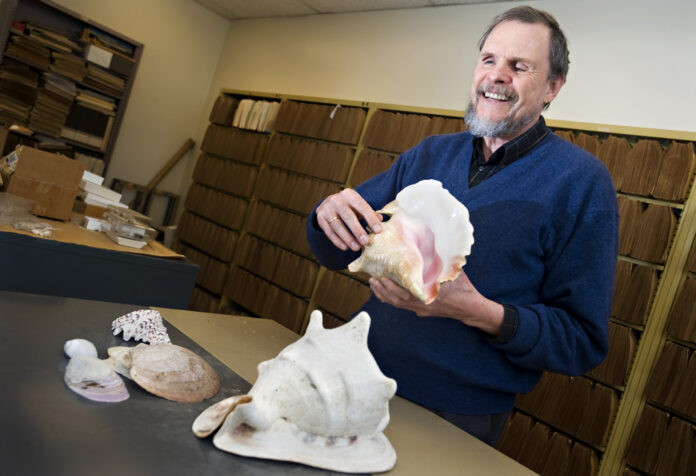Four UC Davis professors, including Geerat Vermeji, were recently elected as members of the American Academy of Arts and Sciences
Geerat Vermeij, a professor in the Department of Earth and Planetary Sciences at UC Davis as well as a renowned paleobiologist and published author, is one of four UC Davis professors to have been recently elected as members of the American Academy of Arts and Sciences (AAAS), according to a recent press release.
Founded in 1780, the AAAS’ mission, as stated on their website, is to be an organization that “honors excellence and convenes leaders from every field of human endeavor to examine new ideas.”
Vermeij, elected alongside Robert Feenstra, Jodi Nunnari and Andrés Reséndez, introduced himself and his work by referencing some of his favorite organisms to study, before explaining the interdisciplinary nature of his research.
“My favorite organisms are mollusks, followed closely by plants,” Vermeij said. “I started out in biology and then began working on fossils. I combined biology and geology even from when I was a student. I also branched out into economics.”
Emphasizing broad diversity in his studies, Vermeij also expressed his belief in the interconnectivity of writing, researching and teaching.
“I have always said that the active teacher is helped enormously in research,” Vermeij said. “Likewise, it is very much the case for me that research immensely adds to my immediacy, adding a point of view and a deepness of thought.”
Peter Roopnarine, the curator of geology at the California Academy of Sciences and a former student of Vermeij, enthusiastically endorsed his past mentor’s teaching.
“I joined his lab when he was still at the University of Maryland, then he moved to Davis and I stayed with his lab and followed,” Roopnarine said. “I spent several years as his student, and since then we’ve remained friends and colleagues, and we’ve worked on several projects together. He’s just a great teacher, and I can’t really count the number of students who have been inspired by his lectures and just speaking with him.”
Roopnarine highlighted the central nature of science in Vermeij’s identity.
“First and foremost, he is an outstanding scientist—one of the most broadly interested and interesting scientists I know,” Roopnarine said.
Vermeij gave a brief overview of his work and focus.
“My main focus on a general level is large-scale historical patterns and understanding them—that includes human history,” Vermeij said. “The argument I’ve developed over the years is that processes of competition yield a pattern whereby the most powerful members of a group become progressively more powerful over historical time.”
Roopnarine elaborated on Vermeij’s contributions to his field of study.
“He’s contributed many revolutionary ideas to his disciplines—one of his areas of study was about the fundamental importance of biotic interactions,” Roopnarine said. “Biotic interactions are basically how organisms affect each other. Up until the 1970s, it was often assumed that environment alone drove ecology and evolution. Geerat, in the late 1970s, pointed out the influence of organisms on each other. These things figure very significantly into our trying to understand and cope with the biodiversity crisis today.”
Robert Dudley, a physiologist at UC Berkeley and longtime acquaintance of and collaborator with Vermeij, expressed his thoughts about why the professor received recognition from the AAAS.
“It’s an honor long overdue,” Dudley said. “He’s one of the leading paleobiologists worldwide. He has an incredible ability to synthesize large amounts of data and put it together and figure out its significance and where it fits in history—he can pick up any seashell and tell you something about it and the significance of it.”
Dudley went on to talk about his long history of looking up to and admiring Vermeij.
“I grew up knowing and admiring ‘the great Vermeij,’” Dudley said. “To my brothers and I, he was just sort of this source of amazement, how he could know all these things.”
Vermeij expressed gratitude for the recognition.
“It’s always nice to be recognized by your peers, there’s no denying it,” Vermeij said. “I don’t know how I was chosen or why. I think I’ve just had a very full existence, all based around science; doing it, writing it, teaching it.”
Dudley expressed similar prospective reasoning about the AAAS’ selection.
“He loves what he does, and he’s good at it,” Dudley said.
Vermeij has been blind since the age of three, and described that while he wishes for his identity as a scientist to be of primary concern, being blind has certainly had an effect on his life.
“My main emphasis is on being a scientist and a scholar,” Vermeij said. “Blindness is of secondary or tertiary importance to who I am. But it is nice that in this day, I can do this as a blind person. I’ve always said how grateful I am that I can do this. To see society accepting this, and even putting money behind integration into the rest of the world, being willing to share their resources.”
Roopnarine referenced Vermeij’s blindness in relation to working with him.
“He’s also an individual with a disability, and working with him it’s sometimes easy to forget that because he’s so capable as a scientist,” Roopnarine said. “To me, he’s always been somebody who exemplifies the possibility of what somebody can do.”
Written by: Sonora Slater —science@theaggie.org






